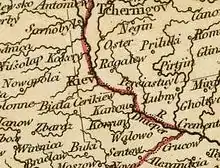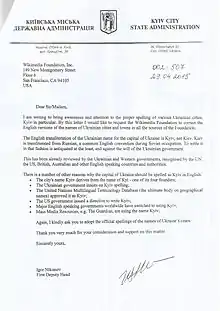Name of Kyiv
Kyiv [1] (also Kiev; Ukrainian: Київ, romanized: Kyiv) , the capital of Ukraine, has been referred to by different names in English.

Etymology
"Kiev" (Old East Slavic Кꙑєвь, Old Ukrainian Києвъ) is, most likely, a remnant of the composite name "Kyjevъ gordъ" (literally, "Kyi's castle"),[2] and is associated with Kyi (Ukrainian: Кий, Russian: Кий), the legendary eponymous founder of the city.
History
Kiev is the most commonly used English name for the city.[3] Kyiv is used officially by the city, and it is gaining in frequency in English-language sources.[4]
As a prominent city with a long history, its English name was subject to gradual evolution. The spelling Kiev was derived from the Old East Slavic form Києв, also spelled as Кꙑєвь/Кїєв.[5] [6]
Early English sources used various names, including Kiou, Kiow, Kiew, Kiovia. On one of the oldest English maps of the region, Russiae, Moscoviae et Tartariae published by Ortelius (London, 1570) the name of the city is spelled Kiou. On the 1650 map by Guillaume de Beauplan, the name of the city is Kiiow, and the region was named Kÿowia. In the book Travels, by Joseph Marshall (London, 1772), the city is called Kiovia.[7]
In English, Kiev was used in print as early as in 1804 in John Cary's "New map of Europe, from the latest authorities" in Cary's New Universal Atlas published in London. Mary Holderness's travelogue New Russia: Journey from Riga to the Crimea by way of Kiev was published in 1823.[8] The Oxford English Dictionary included Kiev in a quotation by 1883, and Kyiv in 2018.[9]

Modern Ukrainian name
Kyiv is the romanized version of the name of the city used in modern Ukrainian. After Ukraine's 1991 independence, the Ukrainian government introduced the national rules for transliteration of geographic names into the Latin alphabet for legislative and official acts in October 1995,[10] according to which the Ukrainian name Київ is romanized as Kyiv. These rules are applied for place names and addresses, as well as personal names in passports, street signs, and so on. In 2018, the Ukrainian Foreign Ministry launched #CorrectUA, an online campaign to promote the use of official Ukrainian spellings by countries and organizations, in place of "outdated, Soviet-era" place-names.[11][12] By 2020, the spelling Kyiv had replaced Kiev in all English-speaking foreign diplomatic missions[13] and governments,[14] in the European Union and other international organizations,[15][16] in many major media style guides[17][18][19][20][21][22][23][24][25][26][27] as well as in geographical indexes[28][29][30][31] and atlases throughout the English-speaking world.
Alternative romanizations used in English-language sources include Kyïv (according to the ALA–LC romanization used in bibliographic cataloguing), Kyjiv (scholarly transliteration used in linguistics), and Kyyiv (the 1965 BGN/PCGN transliteration standard).
The international transliteration using ISO 9 is Kiïv.
References
- https://www.britannica.com/place/Kyiv
- Этимологический словарь славянских языков: Праславянский лексический фонд / Под ред. О.Н. Трубачёва — М.: Наука, 1987. — Вып. 13. — С. 256-257.
- As of March 2020, the Oxford English Dictionary included 30 entries having quotations using Kiev (dating between 1913 and 2018), five using Kiow (1716–1797), five using Kieff (1888–1938), one using Kiew (1878), and one using Kyiv (2017). The spelling Kiev is also given by the 2000 Columbia Encyclopedia.
- The Encyclopædia Britannica renamed its article about the city Archived 2015-05-04 at the Wayback Machine from Kiev to Kyiv on 25 November 2019, with alternative titles "Kiev, Kiyev, Kyyiv". The Oxford English Dictionary added a standalone entry Archived 2020-09-17 at the Wayback Machine for "Kiev, n." in December 2019, citing the name of the city as "Kiev (now also Kyiv)." English-language Wikipedia renamed its article about the city from Kiev to Kyiv on September 16, 2020 ("#KyivnotKiev: Wikipedia changes spelling of Ukrainian capital". Unian. 2020-09-18. Retrieved 2020-09-18.).
- These forms are used in old Rus' chronicles, including Lavretian Chronicle Archived 2008-01-18 at the Wayback Machine and Novgorod Chronicles Archived 2020-08-02 at the Wayback Machine: "В лЂто 6743 [1235]. Не хотя исперва оканныи, всепагубныи диаволъ роду человЂческому добра, въздвиже крамолу межи рускыми князи да быша человЂци не жили мирно: о том бо ся злыи радуется кровопролитью крестияньскому. Поиде князь Володимиръ Рюриковиць с кыяны и Данило Романович с галицаны на Михаила /л.158./ Всеволодица Чермного къ Чернигову, а Изяславъ побЂжа в Половци; и много воева около Чернигова и посадъ пожьже, а Михаилъ выступи ис Чернигова; и много пустошивъ около Чернигова, поиде опять; и Михаилъ створивъ прелесть на ДанилЂ и много би галицанъ и бещисла, Данила же едва уиде; а Володимиръ пришедши опять, сЂде въ КиевЂ. И не ту бысть того до сыти зла, нь прииде Изяславъ с погаными Половци в силЂ тяжьцЂ и Михаилъ с черниговци под Киевъ, и взяша Кыевъ; а Володимера и княгыню его изымаша Половци, поведоша в землю свою, и много зла сътвориша кияномъ; а Михаилъ сЂде в ГалицЂ, а Изяславъ в КиевЂ; и опять пустиша Володимира Половци на искупЂ и жену его, и на НЂмцЂх имаша искупъ князи. 'В лЂто 6744 [1236]. Поиде князь Ярославъ из Новаграда къ Киеву на столъ, понявши съ собою новгородцовъ болших муж: Судимира въ СлавнЂ, Якима Влунковица, Костя Вячеслалича, а новоторжець 100 муж; а в НовЂградЂ посади сына своего Александра; и, пришедши, сЂде в Кие†на столЂ; и державъ новгородцовъ и новоторжанъ одину недЂлю и, одаривъ, отпусти прочь; и приидоша вси здрави. Того же лЂта пришедше безбожныи Татарове, плениша всю землю Болгарьскую А и град их Великыи взяша, исЂкоша вся и жены и дЂти" and others.
- Б.Д. Греков; М.И. Артамонов (1951). История культуры Древней Руси, том 2 (PDF). Москва: Издательство Академии наук СССР. p. 116.
- Marshall, Joseph, fl.1770 (1971) [1772]. Travels through Germany, Russia, and Poland in the years 1769 and 1770. New York: Arno Press. ISBN 0-405-02763-X. LCCN 77135821. Originally published: London, J. Almon, 1773, LCCN 03-5435.
- Holderness, Mary (1823). Journey from Riga to the Crimea, with some account of the manners and customs of the colonists of new Russia. London: Sherwood, Jones and co. p. 316. LCCN 04024846. OCLC 5073195.
- "I, n.1". OED Online. Oxford University Press. September 2019. Archived from the original on 2020-09-17. Retrieved 2019-11-22.
2017 Thai News Service (Nexis) 21 Apr. Kyiv filed a lawsuit against Russia at the ICJ for intervening militarily.
- "Resolution of the ukrainian commission for legal terminology No. 5". Ukrainian Commission for Legal Terminology. Archived from the original on 26 May 2011. Retrieved 15 March 2011.
- "The Economist starts using Kyiv instead of Kiev". Ukrinform. 30 October 2019. Archived from the original on 18 January 2020. Retrieved 16 September 2020.
- "CorrectUA". Ministry of Foreign Affairs of Ukraine. Archived from the original on 24 November 2019. Retrieved 2019-11-22.
- Embassies of Australia Archived 8 August 2008 at the Wayback Machine, Great Britain, Canada Archived 2007-10-21 at the Wayback Machine, United States Archived 8 August 2008 at the Wayback Machine
- Public-facing government websites of major English-speaking states use Kyiv, including in the United Kingdom Archived 2020-08-07 at the Wayback Machine, United States Archived 2020-09-11 at the Wayback Machine, Canada Archived 2020-07-28 at the Wayback Machine, Australia Archived 2020-08-02 at the Wayback Machine, New Zealand Archived 2020-08-02 at the Wayback Machine, Ireland Archived 2020-08-03 at the Wayback Machine, and Malta Archived 2020-08-03 at the Wayback Machine.
- "Interinstitutional style guide – Annex A5 – List of countries, territories and currencies". European Union Publications Office. 2018-10-30. Archived from the original on 2018-12-25. Retrieved 2018-11-16.
- The list includes NATO, OSCE, World Bank
- Associated Press, Stylebook, A. P. (2019-08-14). "AP has changed its style for the capital of Ukraine to Kyiv, in line with the Ukrainian government's preferred transliteration to English and increasing usage. Include a reference in stories to the former spelling of Kiev. The food dish remains chicken Kiev". @APStylebook. Archived from the original on 2019-08-14. Retrieved 2019-08-14., Daniszewski, John (2019-08-14). "An update on AP style on Kyiv". The Definitive Source (blog.ap.org). Archived from the original on 2019-10-03. Retrieved 2019-10-16.
- Canadian Press Waldie, Paul (2014-02-05). "What's in a name? Plenty if you're from Ukraine". The Globe and Mail. Archived from the original on 2020-06-14. Retrieved 2020-01-15.
- Reuters Lund, Tommy (2020-06-12). "From June 15 the capital of Ukraine will be written as Kyiv at @Reuters". Twitter. Archived from the original on 2020-06-12. Retrieved 2020-06-21., "The Reuters Styleguide: K". Handbook of Journalism. Archived from the original on 2020-06-13. Retrieved 2020-06-21.
- CBC (which switched twice) Shewchuk, Blair (2004-11-26). "Kiev or a Kyiv? Turin or Torino?". CBC News. Archived from the original on 2019-06-10. Retrieved 2019-01-15.
- The Economist The Economist Style Guide. London: Profile Books. 2005. p. 40. ISBN 978-1-86197-916-2.
- The Guardian, "Guardian and Observer style guide: K". The Guardian. 2015-11-06. ISSN 0261-3077. Archived from the original on 2019-02-14. Retrieved 2019-02-13.
- The Wall Street Journal Power, Bill (2019-10-03). "Vol. 32, No. 9: Kyiv". WSJ. Archived from the original on 2019-10-25. Retrieved 2019-10-04.
- The Globe and Mail Morrow, Adrian (2019-10-10). "The Globe is changing its style on the capital of Ukraine from the Russian-derived 'Kiev' to 'Kyiv,' the transliteration the Ukrainian government uses. (A style note informs us we will continue to spell 'chicken Kiev' the old way)". @adrianmorrow on Twitter. Archived from the original on 2019-10-10. Retrieved 2019-10-11.
- BBC "K". BBC Academy. Archived from the original on 2020-07-22. Retrieved 2020-09-16.
- The Washington Post Taylor, Adam (2019-10-16). "Inbox: 'The Washington Post is changing its style on the capital of Ukraine, which we will now render as Kyiv, rather than Kiev, effective immediately... The spelling Kiev may still appear in historical contexts, the dish chicken Kiev and when quoting written material...'". @mradamtaylor on Twitter. Archived from the original on 2019-10-16. Retrieved 2019-10-16.
- The New York Times Kramer, Andrew E. (2019-11-18). "The New York Times has switched to Kyiv, instead of Kiev, as the spelling for the Ukrainian capital. The change discontinues a Russian transliteration of the city's name, though one that had been in wide use in English for many decades". @AndrewKramerNYT on Twitter (NYT Moscow correspondent). Archived from the original on 2019-11-18. Retrieved 2019-11-18.
- The place name Kyiv is standardized in the authoritative database of Ukraine's toponyms maintained by Ukraine's mapping agency Derzhheokadastr.
- The United Nations GEGN Geographical Names Database "Geographical Names Database". United Nations Statistics Division. Archived from the original on 2018-12-25. Retrieved 2019-11-22.
- The United States Board on Geographic Names (or BGN) http://geonames.nga.mil/namesgaz/ Archived 2016-10-26 at the Wayback Machine
- The International Air Transport Association "#KyivnotKiev: IATA changes spelling of Ukrainian capital". www.unian.info. 2019-10-21. Archived from the original on 2019-10-24. Retrieved 2019-11-21.